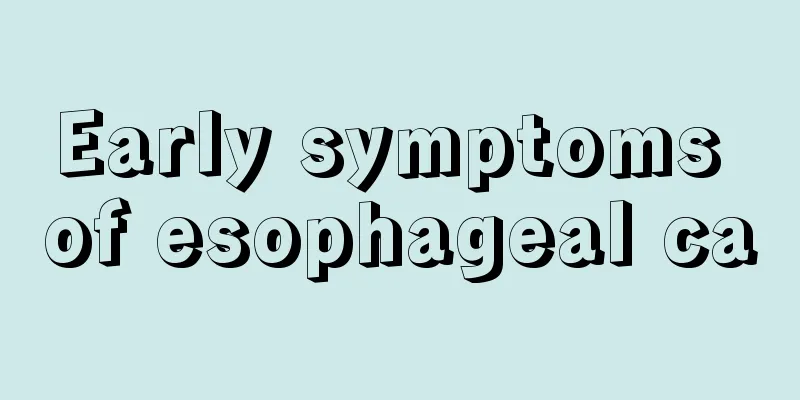Early symptoms of esophageal ca

|
What are the early symptoms of esophageal CA? Esophageal CA is a strange name, but to put it simply, esophageal CA is actually esophageal cancer. The incidence of esophageal cancer is very high among cancers, so it is very common. In fact, many people may not know that they have esophageal cancer. The reason is that they do not understand the symptoms of esophageal cancer and ignore the symptoms, which leads to cancer. So what are the early symptoms of esophageal CA? 1. Early days Symptoms are often not obvious, but there may be varying degrees of discomfort when swallowing rough and hard food, including a choking sensation when swallowing food, burning, pricking, or pulling and rubbing pain behind the sternum. Food passes slowly, and there is a sense of stagnation or foreign body sensation. The choking and stagnation sensation is often relieved and disappears after swallowing water. Symptoms vary in severity and progress slowly. 2. Middle and late stages The typical symptom of esophageal cancer is progressive dysphagia, which first makes it difficult to swallow dry food, then semi-fluid food, and finally water and saliva. Patients often spit out mucous sputum, which is the saliva and esophageal secretions that are swallowed. Patients gradually lose weight, become dehydrated, and become weak. Continuous chest pain or back pain indicates that it is a late-stage symptom, and the cancer has invaded the tissues outside the esophagus. When the inflammatory edema caused by the cancer obstruction temporarily subsides, or part of the cancer falls off, the obstruction symptoms can be temporarily alleviated, which is often mistaken for improvement. If the cancer invades the recurrent laryngeal nerve, hoarseness may occur; if it compresses the cervical sympathetic ganglion, Horner syndrome may occur; if it invades the trachea or bronchi, esophageal, tracheal or bronchial fistulas may form, causing severe coughing when swallowing water or food, and respiratory infections. Finally, cachexia may occur. If there is metastasis to organs such as the liver and brain, jaundice, abdominal effusion, coma, etc. may occur. During the physical examination, special attention should be paid to whether there are enlarged lymph nodes on the clavicle, whether there are masses in the liver, and whether there are abdominal effusions, pleural effusions and other distant metastatic signs. |
<<: How to Treat Esophageal Adenocarcinoma
>>: Famous hospital for breast cancer treatment
Recommend
Will you definitely die if you get skin cancer?
Will you die if you get skin cancer? Skin cancer ...
The dangers of blue light teeth whitening
Nowadays, technology is becoming more and more ad...
How can young people save themselves from limb pain
I have a friend who is only in his thirties, and ...
What to do with high school students who want to get rid of red bloodshot
A rosy face indicates good complexion and a very ...
What are the symptoms of lymphoma?
There are lymph nodes in the human body. The lymp...
What should I do if I have liver cancer?
What should I do if I have liver cancer? Liver ca...
Tympanic membrane puncture surgery
The eardrum is very important to our ears. Someti...
What to eat to remove toxins from the face
If the toxins in your face cannot be discharged, ...
Finger joint pain after drinking
When it comes to drinking, everyone can definitel...
Low-grade fever for one month
Many patients tend to have a continuous low-grade...
What are the symptoms of ovarian tumors
The appearance of ovarian cancer is a kind of har...
Is it good to eat apples at night
I was hungry at night, so I got up to eat an appl...
How to prevent brain tumors
The best way to reduce the harm to brain tumor pa...
How is hamartoma generally treated?
The human body is complex, and human diseases are...
Can chest CT detect lung cancer? Detailed explanation of chest CT examination items for lung cancer
If lung cancer can be detected in its early stage...









